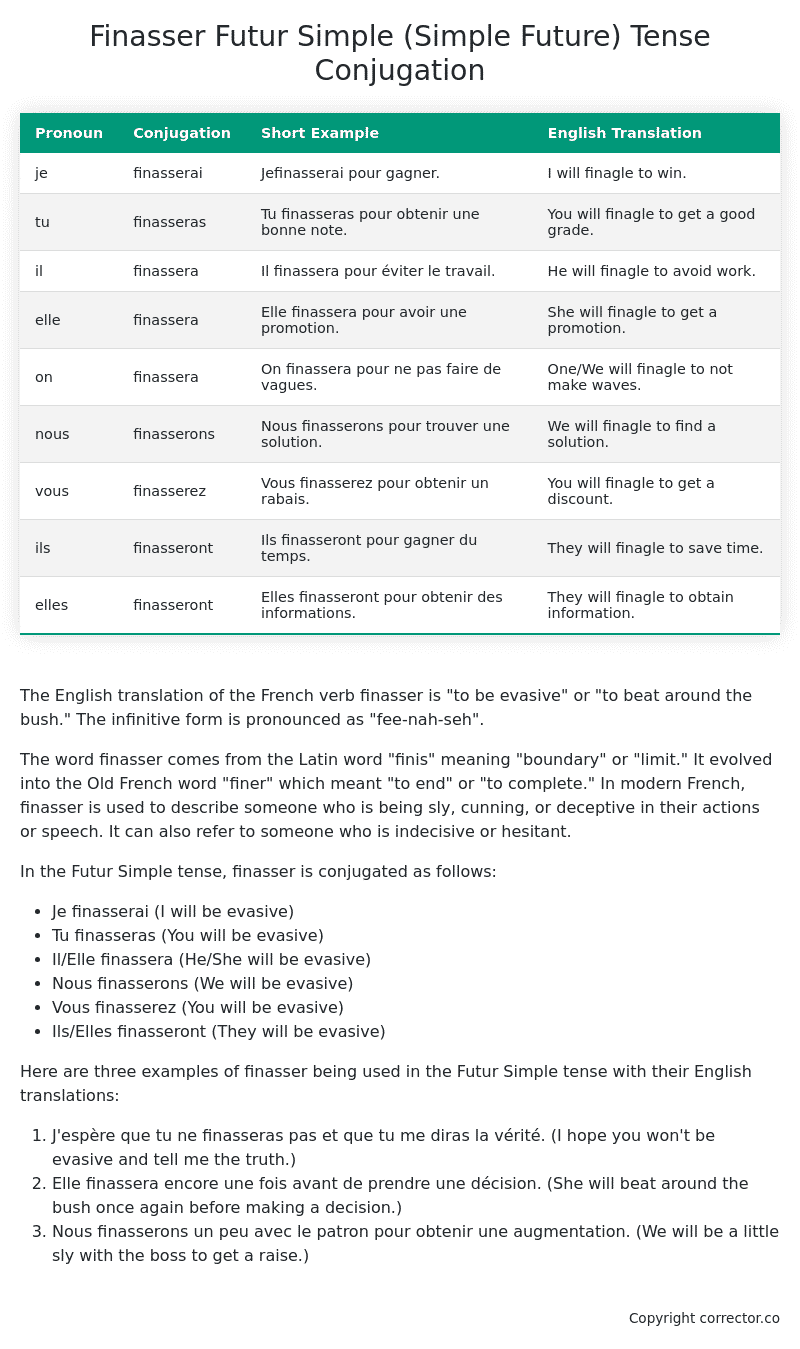Futur Simple (Simple Future) Tense Conjugation of the French Verb finasser
Introduction to the verb finasser
The English translation of the French verb finasser is “to be evasive” or “to beat around the bush.” The infinitive form is pronounced as “fee-nah-seh”.
The word finasser comes from the Latin word “finis” meaning “boundary” or “limit.” It evolved into the Old French word “finer” which meant “to end” or “to complete.” In modern French, finasser is used to describe someone who is being sly, cunning, or deceptive in their actions or speech. It can also refer to someone who is indecisive or hesitant.
In the Futur Simple tense, finasser is conjugated as follows:
- Je finasserai (I will be evasive)
- Tu finasseras (You will be evasive)
- Il/Elle finassera (He/She will be evasive)
- Nous finasserons (We will be evasive)
- Vous finasserez (You will be evasive)
- Ils/Elles finasseront (They will be evasive)
Here are three examples of finasser being used in the Futur Simple tense with their English translations:
- J’espère que tu ne finasseras pas et que tu me diras la vérité. (I hope you won’t be evasive and tell me the truth.)
- Elle finassera encore une fois avant de prendre une décision. (She will beat around the bush once again before making a decision.)
- Nous finasserons un peu avec le patron pour obtenir une augmentation. (We will be a little sly with the boss to get a raise.)
Table of the Futur Simple (Simple Future) Tense Conjugation of finasser
| Pronoun | Conjugation | Short Example | English Translation |
|---|---|---|---|
| je | finasserai | Jefinasserai pour gagner. | I will finagle to win. |
| tu | finasseras | Tu finasseras pour obtenir une bonne note. | You will finagle to get a good grade. |
| il | finassera | Il finassera pour éviter le travail. | He will finagle to avoid work. |
| elle | finassera | Elle finassera pour avoir une promotion. | She will finagle to get a promotion. |
| on | finassera | On finassera pour ne pas faire de vagues. | One/We will finagle to not make waves. |
| nous | finasserons | Nous finasserons pour trouver une solution. | We will finagle to find a solution. |
| vous | finasserez | Vous finasserez pour obtenir un rabais. | You will finagle to get a discount. |
| ils | finasseront | Ils finasseront pour gagner du temps. | They will finagle to save time. |
| elles | finasseront | Elles finasseront pour obtenir des informations. | They will finagle to obtain information. |
Other Conjugations for Finasser.
Le Present (Present Tense) Conjugation of the French Verb finasser
Imparfait (Imperfect) Tense Conjugation of the French Verb finasser
Passé Simple (Simple Past) Tense Conjugation of the French Verb finasser
Passé Composé (Present Perfect) Tense Conjugation of the French Verb finasser
Futur Simple (Simple Future) Tense Conjugation of the French Verb finasser (this article)
Futur Proche (Near Future) Tense Conjugation of the French Verb finasser
Plus-que-parfait (Pluperfect) Tense Conjugation of the French Verb finasser
Passé Antérieur (Past Anterior) Tense Conjugation of the French Verb finasser
Futur Antérieur (Future Anterior) Tense Conjugation of the French Verb finasser
Subjonctif Présent (Subjunctive Present) Tense Conjugation of the French Verb finasser
Subjonctif Passé (Subjunctive Past) Tense Conjugation of the French Verb finasser
Subjonctif Imparfait (Subjunctive Imperfect) Tense Conjugation of the French Verb finasser
Subjonctif Plus-que-parfait (Subjunctive Pluperfect) Tense Conjugation of the French Verb finasser
Conditionnel Présent (Conditional Present) Tense Conjugation of the French Verb finasser
Conditionnel Passé (Conditional Past) Tense Conjugation of the French Verb finasser
L’impératif Présent (Imperative Present) Tense Conjugation of the French Verb finasser
L’infinitif Présent (Infinitive Present) Tense Conjugation of the French Verb finasser
Struggling with French verbs or the language in general? Why not use our free French Grammar Checker – no registration required!
Get a FREE Download Study Sheet of this Conjugation 🔥
Simply right click the image below, click “save image” and get your free reference for the finasser Futur Simple tense conjugation!

Finasser – About the French Futur Simple (Simple Future) Tense
Formation of Futur Simple
For regular -er verbs (e.g., parler – to speak)
For regular -ir verbs (e.g., finir – to finish)
For regular -re verbs (e.g., vendre – to sell)
Common Everyday Usage Patterns
Conditional Statements
Interactions with Other Tenses
Futur Antérieur
Conditional
Present
Summary
I hope you enjoyed this article on the verb finasser. Still in a learning mood? Check out another TOTALLY random French verb conjugation!


